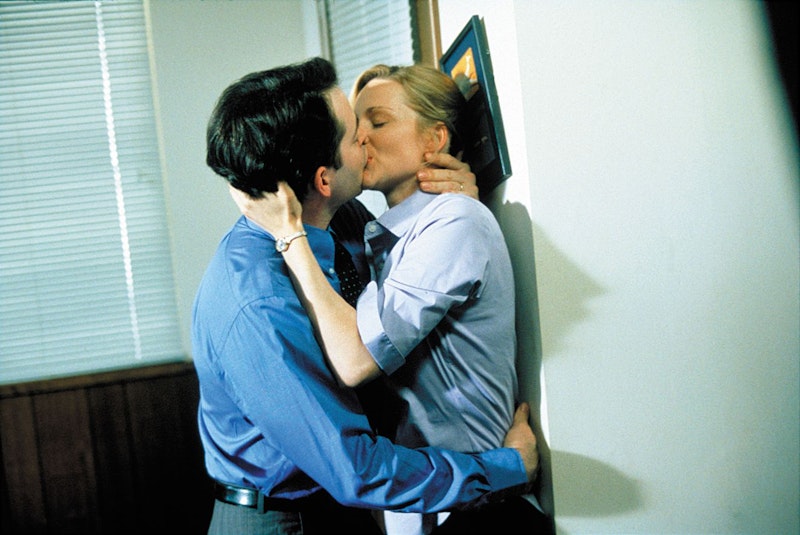Last weekend my wife, son Nicky and I watched You Can Count On Me (2000)—on Amazon Prime, no commercials yet—and it was delightful film (director Kenneth Lonergan’s first) with standout performances from the ageless Laura Linney and Mark Ruffalo. (Ruffalo’s notable for Spotlight (2015), one of the last decent newspaper movies, although it doesn’t match the British mini-series State of Play (2003), starring John Simm, David Morrissey, Kelly Macdonald, Bill Nighy and a young James McAvoy. Russell Crowe starred in a 2009 film based on the series; it was a dog.) Linney’s hardly unknown—she’s received countless awards and nominations for film, Broadway and TV—but I still think she’s under-appreciated, from Primal Fear to the TV shows The Big C and especially Ozark, her best role to date. Something that struck me, though, was how Matthew Broderick—once again, like in Election, playing a middle-aged, unhappily married, slightly out-of-shape schlub who’s Linney’s boss at a small bank, and they have an unconvincing fling—somehow missed out on the leading-man status that was predicted when he starred in John Hughes’ typically puerile, but incredibly popular Ferris Bueller’s Day Off (1986) when he was just 23. I liked Broderick in the Civil War film Glory (1989), and figured he’d be a box-office draw, but it didn’t happen as he switched into character-actor mode (although successful on Broadway) and now, at 61 will likely never be the star in a movie again.
I don’t really care about this—and Broderick, wealthy and working, probably doesn’t either, at least publicly—but it got me thinking about all those John Hughes films from the 1980s, back when he was considered an Industry, that haven’t aged well. Like The Breakfast Club (1985), a mopey, angst-ridden study of five teens from different backgrounds brought together for a Saturday high school detention day. Actors included Judd Nelson, who never amounted to much (I swear it’s the nostrils), and played an unconvincing tough guy; Molly Ringwald an ostensible JAP, whether she was Jewish or not; Ally Sheedy a caricature of a goth-like “weirdo,”; and Anthony Michael Hall (the only winner in the stupid Sixteen Candles (1984), before he bulked up—steroids?—and faded away into TV shows), as the brainy 90-pound-weakling who’s made fun of, and maybe “bullied,” until he bonds with the other kids in a sappy ending.
That brings me to Pretty in Pink (1986), written by Hughes, which might be the worst of those “teen” movies of the 1980s. It’s a silly and unconvincing girl-from-the-wrong-side-of-the-tracks (a pouty Ringwald playing Andie) ending up romantically with a rich kid in what I’d suppose was “penetrating” social commentary for the Reagan Years. Andrew McCarthy, blandly-handsome, who plays Blane, is one of the worst actors of his generation, and though Harry Dean Stanton, Andie’s father, sticks out, unsurprisingly, in his brief appearances on screen, he can’t save this loser. It’s interesting to see a young James Spader, one of the most daring and innovative actors of his time—once he ditched pretty-boy heartthrob roles—(Sex, Lies and Videotape (1989), Crash (1996) and later the TV series Boston Legal and Blacklist)—cast as a snobby, and misanthropic BMOC, but it’s a bad turn, one that he might, in a moment of candor, say he regrets accepting.
Yet, this shitty film, as many have noted over the years, has a killer soundtrack, and it was an album I played repeatedly during that time period. The title song is a re-recorded version by the Psychedelic Furs, a great band for several years. It doesn’t matter that lead singer Richard Butler unabashedly apes David Bowie’s voice—how many bands/singers sound just like Lou Reed and the Velvet Underground?—because he does it so well. The band’s 1984 release Mirror Moves, is close to flawless, featuring “The Ghost In You,” “Heartbeat,” “Heaven,” “Highwire Days and “Here Come Cowboys,” among others. If you put “Love My Way” and “All That Money Wants” on Mirror Moves, it’d be perfect.
I haven’t listened to Orchestral Manoeuvres in the Dark for years, but the band’s “If You Leave” is a fine track that’s representative of the era (so is Depeche Mode, although that band is now unlistenable aside from the classic “Everything Counts”). New Order’s “Shellshock” still resonates with me, and so does Echo & the Bunnymen’s “Bring on the Dancing Horses.” The Smiths—my favorite band of the 1980s—are represented by “Please, Please, Please, Let Me Get What I want” as the album’s closer. I’d ditch the INXS song “Do Wot You Do” for the Del Fuegos’ “I Still Want You,” or Elvis Costello’s “New Amsterdam,” but that’s a quibble.
—Follow Russ Smith on Twitter: @MUGGER2023

